Our Impact in 2021
Our Impact in 2021
Our Impact in 2021
Dear friends,
As John Lennon observed, “Life is what happens to you while you’re busy making other plans.” Going into 2020, our staff had just completed an important visioning process out of which we developed a five-year plan focused on Appalachia’s bright future. We had no idea we would be facing a global pandemic and the resulting economic fall-out that came from it. But the work of developing our new vision, mission, and plan united us with a strong shared sense of purpose that would be critical in facing the challenges ahead. This preparation allowed us to swiftly pivot to serve Appalachian communities, nonprofits, and businesses during this trying time.
Continued…
Over the course of the year, we deployed new rapid response financing tools for borrowers facing impacts from the pandemic and historic floods. In early May, the Paycheck Protection Program was closed out for commercial banks, so we became the only PPP lender in Kentucky literally overnight. We were able to provide $6.1 million of fully forgivable loans that helped more than 400 small businesses stay open. These loans were a crucial resource for small, locally-owned businesses that play a key role in bolstering and diversifying our economy.
Our energy team helped businesses and nonprofits add solar panels and implement energy efficiency projects, finding more than $85,000 in savings on their energy bills this year alone. They successfully advocated for federal and state policies that support fair rates and access to clean energy for all people. The energy economy dominated Eastern Kentucky’s past, is shifting dramatically today, and will be crucial to shaping the future.
When a new federal administration took office, and became focused on the changing energy economy and outdated infrastructure, we jumped in the conversation, advocating for new opportunities and new funding for Appalachia. We have helped shape the administration’s knowledge of coal communities by providing input to the President’s Interagency Working Group on Coal and Power Plant Communities and Economic Revitalization and we look forward to continuing conversations about how to advance just transition in coal-impacted communities.
Our organization’s adaptability, combined with strong connections to regional networks, allowed us to shift our community engagement to virtual spaces, expanding access and participation in our How To Airbnb workshops and in What’s Next EKY?! digital convenings.
Despite these successes, important work lies ahead as we address the ambitious goals in our plan, which include aligning our organizational culture and work with our values of equity and inclusion. Longstanding inequities and disparities have been magnified and illuminated by this pandemic, and our staff has begun to explore better ways of reaching populations that have traditionally been underserved in our region. We have hired an Equity Outreach Specialist to help us as we extend our reach and put our principles into practice.
In a rapidly shifting political, environmental, and economic landscape, investing in a just transition for Eastern Kentucky remains the bedrock upon which we stand and from which we hope to help build a much brighter future. We are grateful for your continued support of the Mountain Association, and hope you’ll continue to follow our progress.
Peter Hille, President
“In a rapidly shifting political, environmental, and economic landscape, investing in a just transition for Eastern Kentucky remains the bedrock upon which we stand and from which we hope to help build a much brighter future.”
Peter Hille, President

We are grateful for your continued support of the Mountain Association, and hope you’ll continue to follow our progress.
Getting Federal Funds to Eastern Kentucky Enterprises
Mountain Association became a Paycheck Protection Program (PPP) lender in March 2021 after Community Development Financial Institutions were authorized to administer these important funds. PPP was implemented by the federal government to support businesses and organizations with fully-forgivable loans to help them through financial strain caused by the economic disruption of the COVID-19 pandemic.
Though we had been connecting clients with an accountant early in the pandemic to help them apply for PPP loans, we wanted to become a PPP lender because we knew people in the region were still having a difficult time getting their applications submitted through commercial lenders. In March and April, we worked with 34 enterprises to secure a total of $250,000 in PPP loans.
Because of impacts related to the pandemic, we closed our fiscal year at the end of April with a historically low capital deployment of just over $1 million. It was a year of small loans, but ones that made a big difference for our clients.
All of that changed in early May when the Small Business Administration announced that funding available for traditional banks and other lenders had been depleted. There was still $8 billion available to CDFIs and other non-profit lenders, though, and with that, the Mountain Association became Kentucky’s only PPP lender overnight.
When the program ended on May 31, we had processed a record 409 loans, and deployed more than $6 million through loans averaging about $15,000 per borrower. From a truck drivers and warehouse union, to self-employed electricians and plumbers, to musicians and museums, these loans helped small businesses and sole proprietors through a difficult time so they could continue to meet vital needs for the people and communities of this region.
Mountain Association’s Impact
670 businesses and organizations strengthened through 3,812 hours of technical support
61 jobs created or saved
$1,058,680 invested in 61 businesses/organizations
$6.1 million in Paycheck Protection Program loans secured for 409 enterprises

The following represents some of the 400+ individuals, businesses and organizations that we were able to help secure PPP loans in just one month:
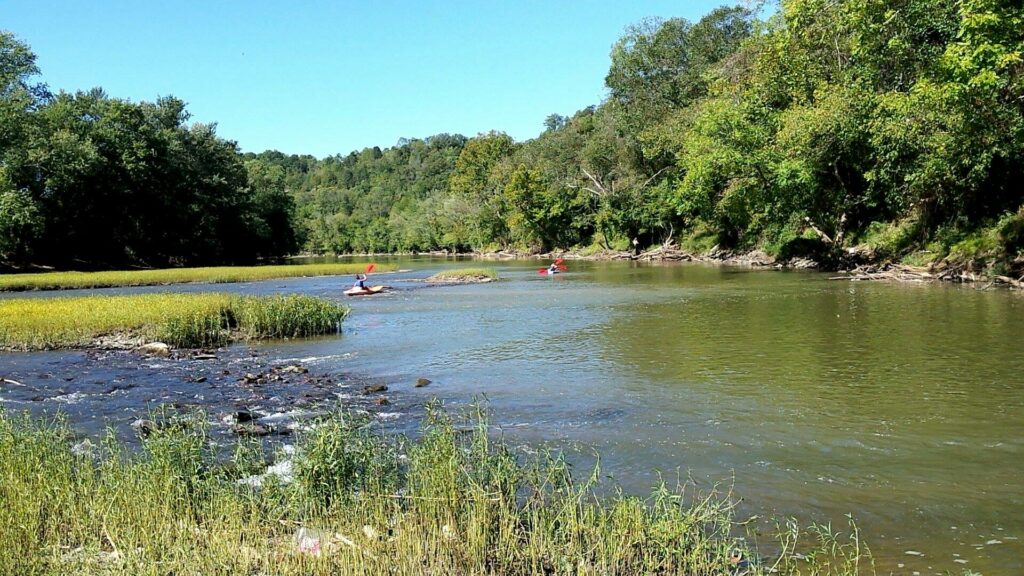
Feature story
Running Kentucky’s Rivers Through a Pandemic
With 1,100 miles of commercially navigable waters, Kentucky has more running water than any other state except Alaska. One family has made Kentucky’s rivers their livelihood, showing thousands of people the way every year for nearly 40 years as recreational river guides.
In 1983, Rick Egedi founded what would become Sheltowee Trace Adventure Resort close to Kentucky’s longest hiking trail, the Sheltowee Trace. Rick got into outdoor recreation through his son’s Boy Scout troop. He started the company by running rafting trips on the Big South Fork and canoe trips on the Upper Cumberland. Today, Sheltowee Trace Adventure Resort offers rafting, canoeing and kayaking, ziplining, camping, cabins, and more. They also provide river services for Cumberland Falls State Resort Park, working hand-in-hand with the state park staff to take visitors out on the water.
Read more
They begin hiring and training staff each spring to prepare for more than 25,000 yearly visitors. At the peak of their season, they employ 50-70 people. But when the COVID-19 pandemic started in Spring 2020, they didn’t know what to expect.
“We were planning to be completely closed, but also open at the same time,” said Dania Egedi, Rick’s daughter who now runs the company. “We’ve had to do a lot of zig-zagging and thinking outside of the box to keep things going.”
They worked with their local bank to access a Paycheck Protection Program loan, and then worked with Mountain Association to access another in the second round of PPP. The PPP loan allowed them to keep their staff employed even as they offered reduced capacity services, strictly following CDC and World Health Organization guidelines. With their profit margins down due to limited numbers, the PPP loan helped them stay afloat and increase pay for their employees.
The company is staying busy as people continue looking for safe outdoor activities. They are proud to report nearly all staff who work closely with guests are vaccinated.
“Our staff always works so hard to keep people safe, and now we are working to keep everyone safe in a different way as well,” Dania said.
Advocating for Fair Rates and Clean Energy
Mountain Association helped secure a huge victory to protect solar net metering by formally intervening in a rate case before the Kentucky Public Service Commission (PSC).
One of Kentucky’s largest utilities, Kentucky Power, sought to reduce the benefits of solar net metering for its customers. In addition to changing their solar net metering rate from the current one-to-one credit to substantially less, the case included the company’s third request to increase rates in the past five years, with rate structure changes that discouraged energy efficiency measures.
We executed a robust communications campaign with Kentuckians for the Commonwealth (KFTC) and KY Solar Energy Society to generate more public awareness and increase public comments in these cases. More than 250 public comments were filed through KFTC’s website for the Kentucky Power case. We encouraged the PSC to host virtual public hearings so customers could safely participate during the pandemic, and ultimately three such hearings were held. Op-eds written by Mountain Association staff were published in key newspapers, which led to two additional media outlets covering the issue with their own investigative reporting.
Read more
Through our formal intervention, we were able to contribute to the PSC’s rate-making process with testimony, discovery, and cross-examination. All of these efforts resulted in key decisions by the PSC in 2021, including a lower rate increase than requested and the decision to uphold solar net metering.
We also intervened in another case this year, filed by LGE & Kentucky Utilities, furthering our advocacy for reasonable rates and fair solar net metering policies.
In 2022, we will continue participating in the Rural Power Coalition, which is working on policies to transform rural electric cooperatives and their communities by speeding the retirement of fossil fuel generation and investing in energy efficiency, renewable energy, broadband and energy-bill relief.
We are also partnering with KFTC to recruit members across all 23 rural electric cooperative service areas in Kentucky to research and produce a co-op scorecard. Similar scorecard projects are happening in other Southern states through the Advancing Equity and Opportunity Network. This is an important part of a longer-term strategy to better engage co-op member-owners and build local power. While we hope we’ll be successful in shifting policies at the federal level, this place-based organizing is essential to holding co-ops accountable to truly serving rural people.
Mountain Association’s Impact
38 energy retrofits completed
423 metric tons of carbon reduced through efficiency and solar upgrades, equivalent to offsetting 1 million miles of driving
More than $85,000 in savings for 51 businesses, organizations and homes
$138,676 in clean energy funding received by 14 businesses as a result of our grant application support
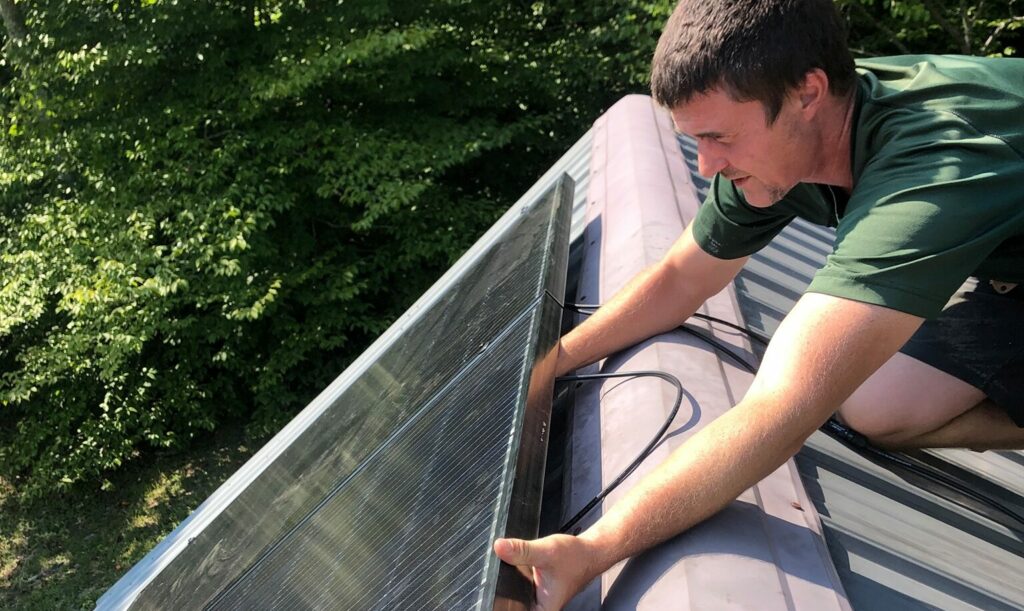
Feature story
Building a Clean Energy Workforce
We provided training in renewable energy design and installation to 10 Eastern Kentuckians over the last two years through our New Energy Internship program.
The internship program has been an important part of strengthening the clean energy sector in Eastern Kentucky, and has helped bring energy savings to individuals and enterprises, while also helping combat climate change. Two of our final interns are continuing this important work in their communities.
Fuzz Johnson, an employee at the low-income housing organization, HOMES, Inc., enrolled in the program in 2020. Fuzz is an electrician in training, and has now added solar specialist to his job description. He worked with our staff and our installer partner, Wilderness Trace, Inc., throughout the year to learn about solar energy installation. He completed valuable training courses with Solar Energy International and earned the North American Board of Certified Energy Practitioners (NABCEP) PV Associate certification. Our clients and partners have since begun hiring HOMES’s crew to complete installations, including those at the Foundation for Appalachian Kentucky, Pantry Shelf Grocery, and Buckhorn Children & Family Services. Providing solar installation services has allowed HOMES to generate additional revenue to support their important nonprofit work and incorporate solar into a number of affordable housing projects.
Ben Tatum started Appalachian EnergyWorks in Pine Ridge upon graduation from the program in 2020. With his New Energy internship training, and NABCEP PV Associate certification, Ben was able to hit the ground running with his new business. He has already completed several solar installations at businesses and homes across Eastern Kentucky. Having received training in grant writing and packaging during the internship, he has also assisted his clients in bringing thousands of dollars in grants to support their energy projects. He continues to perform commercial energy audits as a contractor for Mountain Association.
New Leadership, New Narrative
We continue to see promising opportunities for the region, particularly coming from the new federal administration.
This year, we continued work led by the Just Transition Fund to craft
the National Economic Transition Platform as part of a coalition of 80 local, tribal, labor, and nonprofit leaders living and working in coal communities. This included a major push in 2020 outlining the seven pillars of the platform to bring more awareness of just transition to legislators, community leaders, and the incoming Presidential administration.
Mountain Association staff were quoted in pieces published by six major media outlets, and we published our own op-eds highlighting the potential for Eastern Kentucky in light of the new administration’s priorities. We saw our efforts to advance the NET Platform bear fruit just seven days into the new administration when President Biden pledged to “put the full power of the federal government” behind an economic transition for coal communities. He signed an Executive Order creating the Interagency Working Group (IWG) on Coal and Power Plant Communities and Economic Revitalization. The IWG is tasked with developing a revitalization plan for coal-impacted communities across the nation. Federal investment of this scope and scale will help bring economic and clean energy opportunities to communities in Eastern Kentucky that desperately need these resources for transition.
Read more
Mountain Association’s voice has gained credibility after several years of dedicated relationship building with local, regional, statewide and national media. In one year, our work has appeared in 129 different media stories, from local newspapers to NPR’s “Marketplace”, Bloomberg News, and The New York Times. These features focused on transition issues including clean energy, rural electrical cooperatives, and the impacts of climate change in Eastern Kentucky.
Our communications team worked with CBS news to craft a more nuanced story about coal miners transitioning to different careers that better explains the context of Eastern Kentucky’s long history with extraction and the future the region is trying to build. We ultimately connected them to one of our former New Energy Interns, Scott Shoupe, whom they interviewed, along with our president, Peter Hille, for a Climate Changemakers feature that aired in Summer 2021.

Mountain Association’s Impact
71 stories about clients and communities shared
130 articles or mixed media by local and national outlets featuring our work
1,775 new followers across social media
Financials
The majority of the Mountain Association’s funding comes from private grants and contributions (49 percent), followed by financing revenue, including interest and fees (28 percent), government grants (17 percent) and other revenue, including program income (6 percent). We dedicate most of our spending to our programmatic work. Full financials are available here.
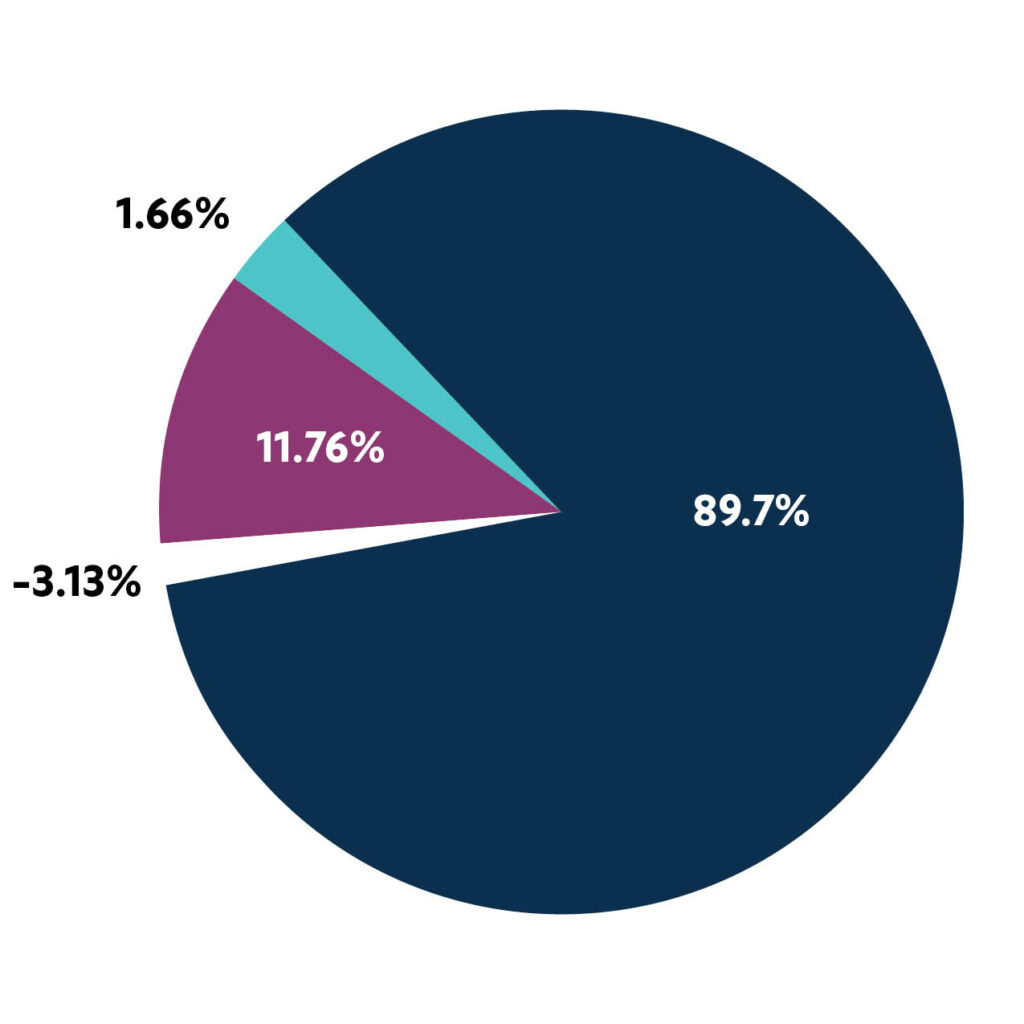
2021 Expenses
| Program expenses | 89.71% |
| Fundraising expenses | 1.66% |
| Management and general expenses | 11.76% |
| Financing expenses | -3.13% |
Our Work as an Association
A just and equitable economic transition in Central Appalachia cannot be achieved by any single community group, nonprofit, institution, or entity alone. We must work together in interconnected networks to move toward a brighter future. The Mountain Association provides support to networks and non-profits that are aligned with our mission of advancing a new economy in the region. Specifically, we provide fiscal sponsorship and support for three networks and two affiliates that are advancing just transition in important ways: Central Appalachian Network, Appalachia Funders Network, Ridgeway Leadership, Kentucky Natural Lands Trust, and KyPolicy. We’ve included highlights from our affiliates in this report.

KyPolicy Supports Kentuckians Through Hardships
The Kentucky Center for Economic Policy conducts research, analysis, and education on important issues facing Kentucky in three primary issue areas: strengthening public investments in education, healthcare and more through an equitable tax system; increasing economic security for Kentuckians by improving job quality and through food assistance, Medicaid, jobless benefits and other critical safety net supports; and, reducing incarceration.
Read more
In fiscal year 2021, KyPolicy adapted to challenges of the COVID-19 pandemic and advanced policies that help all Kentuckians thrive. At the state level, they were part of successful coalition efforts to pass bills that raised the felony threshold, ended the mandatory transfer of juveniles to adult court, reversed the ban on SNAP nutrition assistance for people with a drug-related felony in the past, restricted the use of no-knock warrants, ended Medicaid co-pays and capped insulin costs for some Kentuckians. They also were successful in limiting the amount of state revenue given away in new special interest tax breaks. At the federal level, they contributed to national efforts calling on Congress to provide robust COVID-19 relief – assistance which has reduced hardship and kept families and the economy afloat.
Impact numbers
75 meetings with decision-makers and public officials
(largely in virtual settings)
188,519 hits to the website
3+ media mentions per week
73 policy analyses published
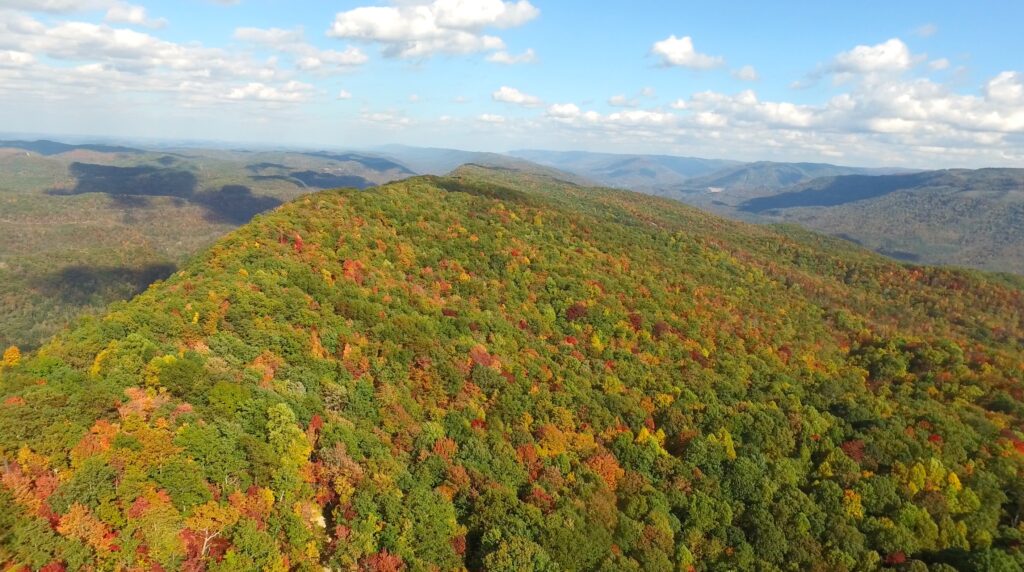
Warbler Ridge Preserve – photo by Bill Lancaster
Kentucky Natural Lands Trust Celebrates Major Milestones
Kentucky Natural Lands Trust recently celebrated its 25th Anniversary and a notable benchmark – protecting more than 50,000 acres of wildlands in the Commonwealth. Through the power of partnership KNLT has safeguarded wild places from Pine Mountain in Central Appalachia to the sloughs of the Mississippi River.
Read more
KNLT created its largest preserve to date with the 3,045-acre Warbler Ridge Preserve near Cumberland in Harlan County. The preserve protects biodiversity, safeguards streams that provide drinking water to local communities, and secures a link for building out the developing Great Eastern Trail. A large portion of the land was acquired from the Southeast Education Foundation whose mission is to support the Southeast Kentucky Community & Technical College network. The proceeds from KNLT’s purchase of the land will be deployed by the foundation for student scholarships and campus investments in the region..

Impact numbers
50,000 acres protected across the Commonwealth in KNLT’s first 25 years
3,045 acre preserve established on Pine Mountain in Harlan County
First 50 miles of the Great Eastern Trail completed
Thank you to our supporters
and to our many generous individual donors and partners.
Appalachian Regional Commission
Catholic Campaign for Human Development
William Randolph Hearst Foundation
Kentucky Office of Energy Policy
Charles M. and Mary D. Grant Foundation
Mary Reynolds Babcock Foundation
Opportunity Finance Network
Marguerite Casey Foundation
The Chorus Foundation
US Small Business Administration
Rural LISC
Just Transition Fund
The JPB Foundation
Sign Up for Monthly E-news!
We send our newsletter once a month, full of stories from Appalachia and new opportunities for businesses & nonprofits around the region.